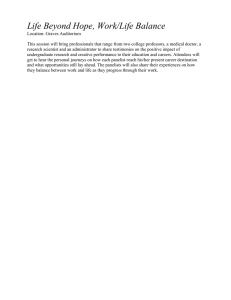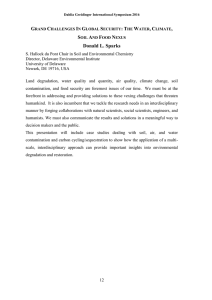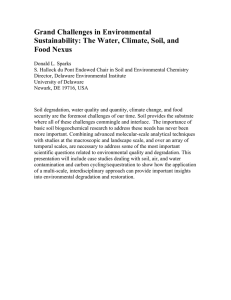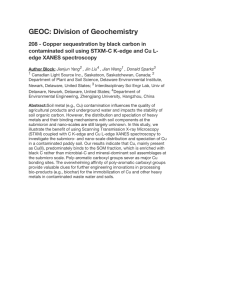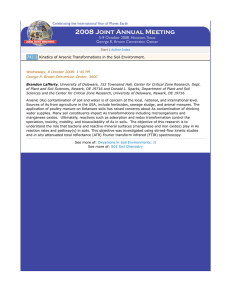Stephen A. Bernhardt Lecture Student Remarks Presented by Kristin Staats
advertisement
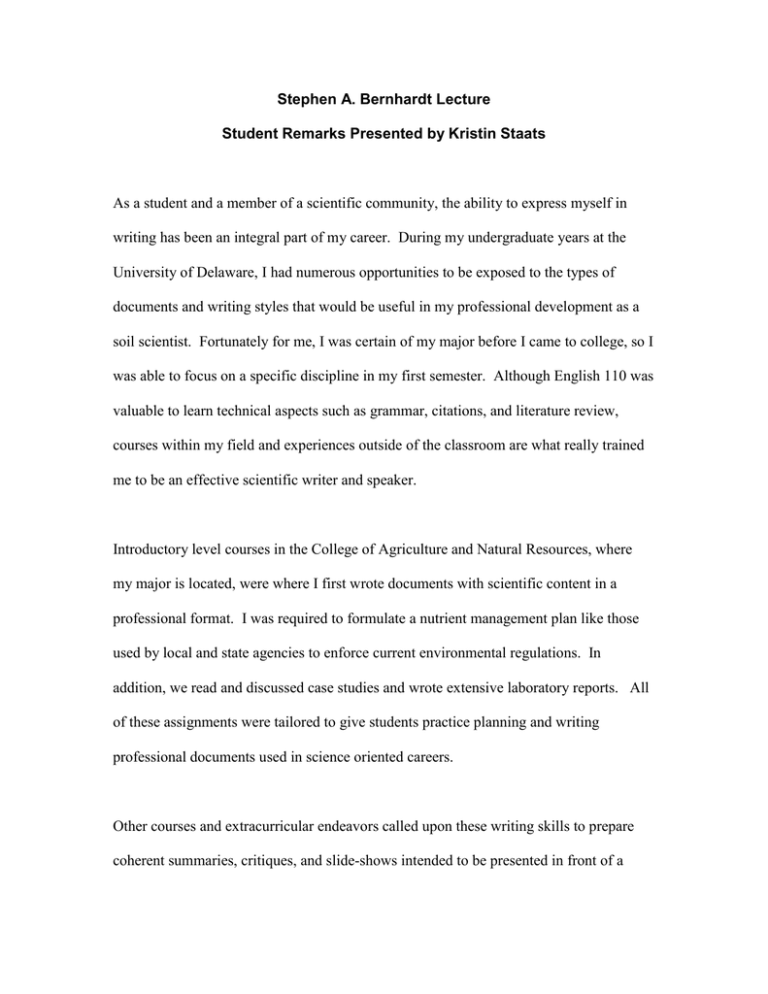
Stephen A. Bernhardt Lecture Student Remarks Presented by Kristin Staats As a student and a member of a scientific community, the ability to express myself in writing has been an integral part of my career. During my undergraduate years at the University of Delaware, I had numerous opportunities to be exposed to the types of documents and writing styles that would be useful in my professional development as a soil scientist. Fortunately for me, I was certain of my major before I came to college, so I was able to focus on a specific discipline in my first semester. Although English 110 was valuable to learn technical aspects such as grammar, citations, and literature review, courses within my field and experiences outside of the classroom are what really trained me to be an effective scientific writer and speaker. Introductory level courses in the College of Agriculture and Natural Resources, where my major is located, were where I first wrote documents with scientific content in a professional format. I was required to formulate a nutrient management plan like those used by local and state agencies to enforce current environmental regulations. In addition, we read and discussed case studies and wrote extensive laboratory reports. All of these assignments were tailored to give students practice planning and writing professional documents used in science oriented careers. Other courses and extracurricular endeavors called upon these writing skills to prepare coherent summaries, critiques, and slide-shows intended to be presented in front of a class or professional committee. While I was comfortable with my writing skills, I lacked experience in oral presentation; however, with the help of a few professors and lots of practice, this deficiency was soon remedied. A particularly important course was Introduction to Environmental Consulting, which focused on connecting scientific data and information with business, ethics, and the public. Every week, each student wrote concise, informative papers and presented them in front of the class in a two to three minute speech. Having length restrictions on these assignments stressed the importance of brevity, while being careful to include all necessary facts. The emphasis on public relations and business ethics made clear how critical it is to be able to bridge the economic factors of a remediation project with the concerns of the general population. Unlike any other course, I gained an understanding of how professionals in an environmental field have to think, speak and write. In addition, an advanced undergraduate course in soil physics also promoted the development of scientific writing and presentation skills. Because the professor desired to advance our abilities, not only as students, but also as members of scientific community, Dr. Jin required us to read and critically review journal articles. This exposed us to the format of this genre and encouraged us to think about topics and projects in the soil physics field. We also learned to be aware of the quality of research being described in the publications we reviewed, as well as considering the credibility of information in them. After learning written and oral communication skills in the classroom, internships and undergraduate research gave a more “real-world” place to apply them. Each of these jobs required technical, scientific communications specific to my major and possible careers in the natural resources and conservation. First, with the United States Department of Agriculture, I helped in the development of the manuscript for the Delaware soil survey. As an environmental scientist intern for a private environmental consulting firm, I gave paragraph descriptions of calculations of landfill gas emissions. Through the Delaware Water Resources Center, I worked on an individual research project and presented my findings at a scientific poster session. I also completed a degree with distinction, which gave me the opportunity to attend professional society meetings, display a poster several times throughout my research, as well as write and defend my senior thesis. Combined, my academic and internship experiences gave me numerous views of the kinds of communication skills that I would need as a professional. More than just giving me a chance to practice my oral and written communication, I also discovered careers that interest me because I have had the opportunity to be a part of various professional environments. While the programs in which I participated were not required for my degree, advisement from faculty and administration let me know that these opportunities were available and the benefit of working outside of class was often stressed. As a student, my opinion is that course work, supplemented with research or internship positions relevant to an undergraduate’s major, are where students learn how to become active, effective communicators within his or her discipline. Although my major is focused around science and math, my professors, supervisors, and mentors never neglected the importance of being able to convey thoughts both on paper and aloud. Possessing the ability to communicate effectively has built my resume, my confidence, and my abilities as a writer, student, and scientist.
